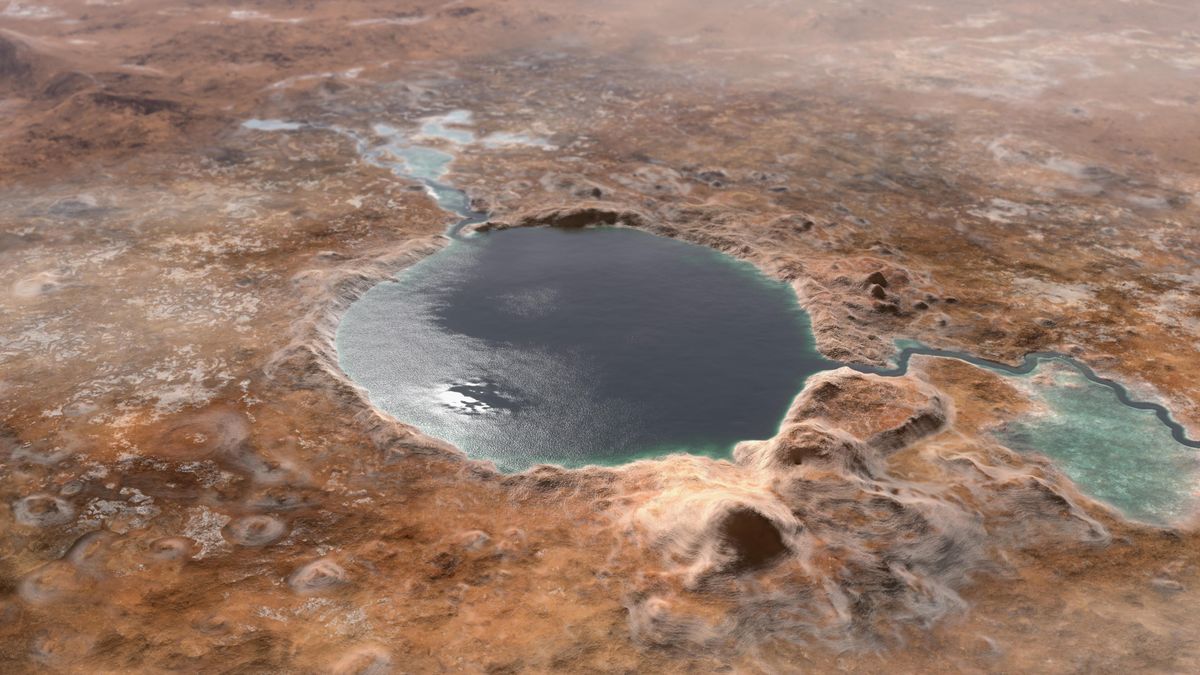NASA’s Perseverance rover has provided evidence of ancient lake in the Jerezo Crater on Mars, on the Red Planet’s watery past. This discovery, detailed in a recent study published in Science Advances, supports theories that Mars, now a cold and arid world, once harbored vast bodies of water with the potential to sustain microbial life.

Also Read: GJ 9827d: Water Vapour Found On Exoplanet By NASA’s Hubble Telescope
The research, led by teams from the University of California at Los Angeles (UCLA) and the University of Oslo, relied on subsurface scans conducted by the car-sized, six-wheeled rover throughout several months in 2022.
Equipped with the Radar Imager for Mars’ Subsurface Experiment (RIMFAX) instrument, Perseverance traversed the Martian terrain from the crater floor to an area resembling Earth’s river deltas.
The RIMFAX instrument sent radar waves downward at 4-inch intervals, capturing from depths of about 65.6 feet (20 meters) below the surface.
This technology provided a cross-sectional view of rock layers, allowing scientists to examine the geological composition of the Martian subsurface.
UCLA planetary scientist David Paige, the lead author of the study, likened the radar data to looking at a road cut.
The layers revealed evidence of soil sediments carried by water, pointing to the existence of an ancient lake in the Jerezo Crater.
These sedimentary deposits, estimated to have formed around 3 billion years ago, resemble the processes observed in Earth’s lakes.
The findings confirm previous orbital imagery and data, supporting the hypothesis that portions of red planet were once covered in water.
Also Read: Iran Successfully Launches Sorayya Satellite into 750 km Orbit
The discovery confirmation of lake sediments, as the RIMFAX readings unveiled signs of erosion both before and after the formation of sedimentary layers at the crater’s western edge.
This suggests a complex geological history, with volcanic rocks initially detected near the rover’s landing site exhibiting signs of alteration due to water exposure.
The confirmation of ancient lake sediments bolsters the theory of a watery past on the red planet but also as validation for the selection of the Jerezo Crater as Perseverance’s exploration site.
Initial remote analysis of core samples taken by the rover at its landing site revealed volcanic rocks instead of the sedimentary rocks.
The revelation of an ancient lake in Jerezo Crater raises possibilities about Mars’ past habitability. The warm, wet conditions inferred from the sedimentary layers suggest a radically different Martian climate billions of years ago.
Scientists now anticipate an examination of the Jerezo Crater’s sediments, collected by Perseverance for future transport to Earth.
This discovery with previous findings from NASA’s Curiosity rover, which showed the presence of a vast network of ancient rivers on Mars.
The combination of data from both rovers contributes to a growing body of evidence suggesting that red planet was once a planet with flowing water.
Also Read: James Webb Space Telescope Discovers the Oldest Black Hole Ever





/cloudfront-us-east-2.images.arcpublishing.com/reuters/UFDKK3AZC5MOXIGGLHKIZXECO4.jpg)

















